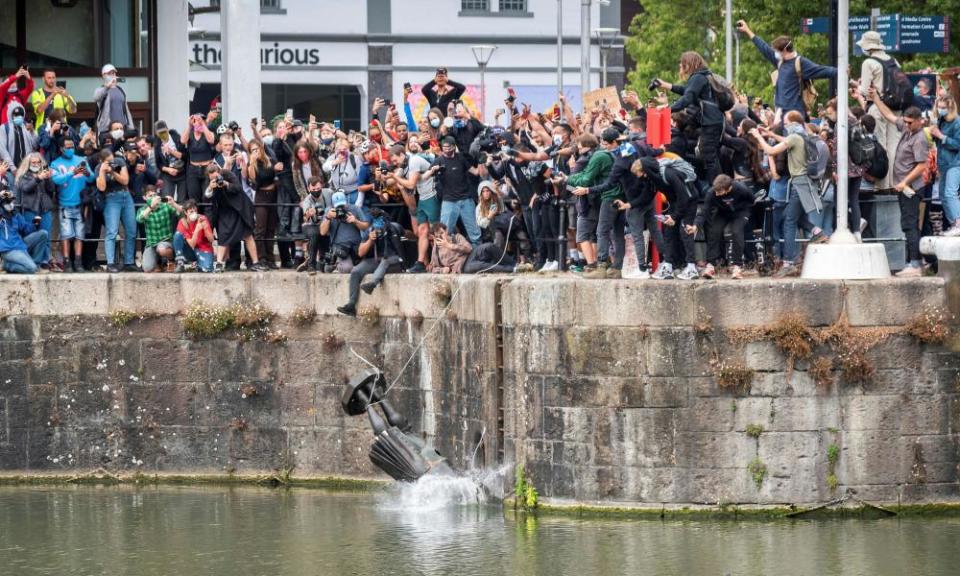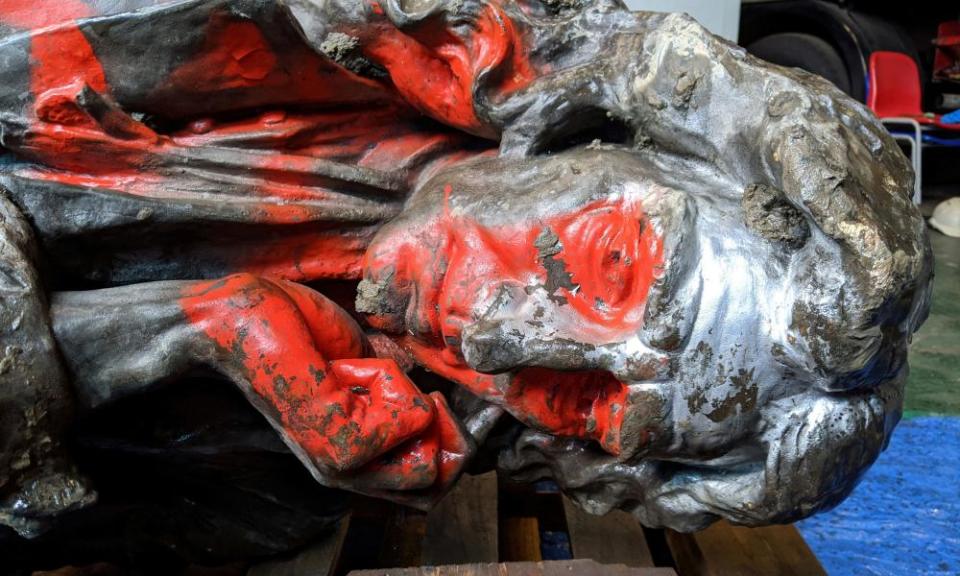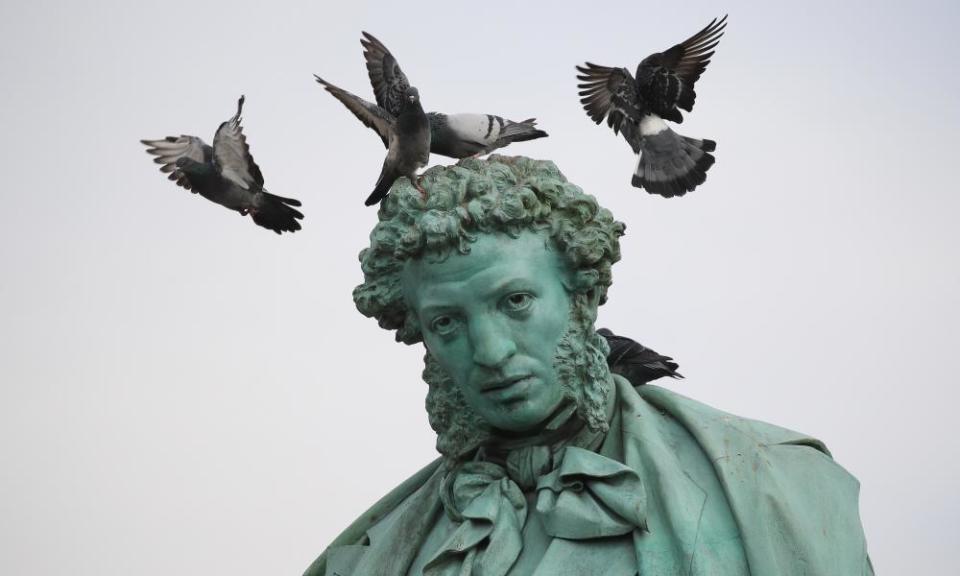Olivette Otele: 'Discussions of cancel culture are very middle class. Activists just survive and support each other'
Olivette Otele is the quintessential African European. She was born in Cameroon, grew up in France where she received her education, and now lives in Wales. In 2018, she became the UK’s first black female history professor, and this she year was included in the “100 Great Black Britons” list. When Edward Colston’s statue was torn down and dragged into Bristol’s harbour, Otele, who teaches the history of slavery at the University of Bristol, could not have been better placed to witness and process the moment.
“I live just across the [Severn] bridge in Newport,” she says, “and I was very surprised by the whole movement. It was coming from young people taking matters into their own hands. But I also understand that this conversation has been going for decades and it looked as if we’d exhausted all other avenues.” Her first thought, when she saw the statue being thrown into the harbour was that it reminded her of underwater slave memorials. Colston’s statue, she believes, belongs in a museum, with the scars and dents of his journey to the harbour intact. “It would be interesting to see those moments within the body of the statue, as long as we have it somewhere where it can be contextualised. It’s part of the history of Bristol.”
Otele has a fundamentally hopeful view about Britain and its race relations. She moved to the UK from France “for love”, but also from anxiety. “Twenty years ago, Britain offered a space I couldn’t find in France. In France, I wouldn’t want to have children. I wouldn’t want them to have to fight, emotionally and physically. Britain gave me a space and a chance to regenerate.”

That regeneration and space were needed because – living in France – she found her identity was always presented to her as “an either/or”. With her first book in English, she attempts to challenge that dichotomy by revealing a long history of African European identity that does not conform to the boundaries applied today. African Europeans: An Untold Story is a broad historical sweep that begins with the queens of Merowe on the Nile a few centuries BC, and ends in present-day Britain. Otele speaks to me from one of her children’s rooms, and her youngest child bounces in and out a couple of times during our conversation. She talks with the zeal of a historian and the warmth of someone who feels connected to the next generation of African Europeans. She tells me that she wrote the book for personal reasons.
“In France, you are either French, which basically means white, or French ‘of so and so origin’.” The latter was emphatically second class, but Otele sees no reason for the separation. “For me they are completely intermingled.” As well as France, her family has connections in Germany, where her relations have lived for three generations. These Africans in Europe feel as if they have multiple identities, none of which negates their European one. But according to Otele, “society didn’t see her that way”.
The book is many things. A scholarly work that reveals detail and colour about African Europeans; a study in how race waxes and wanes in its significance within social structures; and a claiming of black history as European history. But more than anything it is a rebuke – a rejection of the simplistic accounts of race and the history of black people in Europe.
Otele is, in this historical moment of Black Lives Matter, clearing a space within which to discuss race on her own terms. As someone who has been thinking about these things for a long time, she has little interest in the current wars on race and cancel culture. “I don’t pay attention to any of that,” she says. “These discussions are very middle-class discussions. Activists and members of the black community, who tends to be working class, just survive and support each other. I think people get lost in these discussions, which are not precisely about inclusion or about making society better.”
For Otele, the world is split into two: the dimension of the media and politicians, in which public discourse about race in general is polarised and reactionary; and another realm in the real world, on the ground, that is dynamic and diverse. There is a contrast between how Black Lives Matter has played out spontaneously in the streets and the way the movement has been folded into a popular narrative of incursive interests. It demonstrates, as far as Otele is concerned, that responding to all the ephemeral frequencies of racism diverts energy from the real work of challenging oppression.
The long history that she covers renders culture war skirmishes mere reactionary moments that say little about where we are. Her perspective is informed by insight into societies in the past that, although primitive when compared with the present day, had what would be considered enlightened views on race. The book focuses on characters of African origin from the Roman empire, to the Medicis, to aristocratic Russia.

The reason these accounts are not more well known is, to put it in a “mean” way, Otele jokes, simply “intellectual laziness”. Our horizons are so small that we only want to present stories that are “easy to understand, stories that put people of African descent in boxes. When stories are easy to understand, they are also easy to control.” That control is what Otele wants to prise away from the mainstream narrators of European history.
Race, she believes, like all other features of identity, is subject to the values prized in a society at any one time. It is tempting to see those values in Europe as linear and progressing from racist to liberal as the continent left slavery and colonialism in the past, but it’s not that simple.
Through the example of African Europeans such as Marcus Cornelius Fronto, a Roman of Berber origin who became tutor to two future emperors, Marcus Aurelius and Lucius Verus, Otele shows how race was not necessarily a hurdle to achievement. “The Roman empire had more consideration for its subjects who were living within it than 18th-century colonies.” It is unthinkable that there would have been a colonial era equivalent of, for example, Lucius Septimius Severus, an African Roman emperor from 193-211 AD. His analogue would have been a north African person ascending the British throne as king or queen.
“Under the Roman empire you had that understanding that all Roman subjects were actually capable of achieving something. It was about, not necessarily class, but it was about power. It was about those who were fierce enough, hungry enough to manage, whether they were on the fringe of empire, or within empire.”
In Europe in the 18th century, opportunities were radically reduced, and the elevation of those of African birth into elite circles could not happen without the sponsorship and protection of powerful white advocates. The book is full of these African protagonists, either born in slavery or enslaved and transported to Europe at a young age. Some then exhibited great talent and skill either in scholarship, sports, or music, and were given passage into white society and permission to marry white women. One of them, central African-born general Abram Petrovich Gannibal, a slave kidnapped as a child and gifted to Peter the Great, was Alexander Pushkin’s great grandfather.

We find it difficult to conceive of a world in which race is anything other than the prime indicator of someone’s status in white majority countries. But where race sits as a status determinant is not final. Otele wants people to understand that fighting racism is a long game, one that starts with refusing to see race as a barrier. “Race, resilience, resistance” is how she puts it.
Her academic detachment gives way to a sharper tone, one of indignation, when she speaks of the various loyalty tests British people of colour are subjected to. As with the French identity, the notion of Britishness is limited and uniform, one that interrogates citizens of foreign extraction, rather than accommodates them. “We are more than the idea of Britishness that is presented to us. It’s skewed, it’s based on a specific time and place, because even Britishness is shifting constantly. But most people of African descent specifically, and sometimes those of Asian descent, are expected to demonstrate loyalty ... They are made to feel guilty about being attached to the idea of being, for example, from African descent of from Caribbean descent, or Asian descent. It’s ridiculous because the world is global, Britain is and was a global power, and in the 17th and 18th century, those questions were not that important.”
This fixation on what it means to be British, and how that branches out into questions about fealty or integration, is related to a colonial loss of status by a country that never quite got comfortable enough with the colonised decamping to its shores. “It’s quite a novel perception of what loyalty is. For example, the enslaved were not subjects, but they were part of the British empire, they belonged to the British and in a way, were British. They have been free for some time. But as free people, they are questioned. They are challenged. It’s really about the anxiety of losing property.”
The policing of identity is what Otele wants to free herself – and other black people – from, while giving them the tools to scope out and own their own valid place in the world. Without that autonomous navigation, Europeans of African descent will be stuck in a racial discourse that looks as if it is dynamic and shifting, but is in fact terminally repetitive.
“I keep saying this to people around me. Racism keeps shifting as well. And what we end up doing is answering back, instead of actually creating stories of a long thread of resistance, of community collective cohesion or inter-community collaborations that are not necessarily referring to the white community. What we’re being pushed towards is these binaries.”
Racism keeps shifting. What we end up doing basically is answering back, instead of creating resilient stories
Olivette Otele
Black people are constantly asked to “answer back to oppression, rather than having these nuances. I am trying to inject nuance. Our answer so far is to resist, rather than to create. And those who create actually are the ones who give me incredible hope. Communities, grassroots communities.” She mentions Black South West Network, a BME led infrastructure organisation working for race equality across the south-west; Babbassa, a social enterprise that supports youth; One Bristol Curriculum; and the Bristol Commission for Race Equality (Core) which she chairs, and is staffed by “outstanding individuals who are making a contribution to Bristol’s various communities outside their normal paid jobs”. All such organisations should have, Otele believes, more “prominence in the grand narratives of oppression, because they’re not just about oppression. The binary discourse is detrimental and it’s a trap.”
Otele is measured in her speech but barely contains her passion whenever she touches on the vast unclaimed history of Africans in Europe. As a historian she sees the level of detail and research that goes into European history. “So why don’t we have that as people of African descent? Well actually, we do.”
A rich theme in her work is that of communities and networks of support that have existed for centuries, and which were, and still are, crucial in the consolidation of African European communities. In her book, she describes enslaved populations in Europe not as atomised helpless individuals, but well read and informed about their legal rights in different jurisdictions. Slaves often challenged their owners in courts of law, and drew on the knowledge of other members of the liberated and indentured populations.
That is still the way forward for Otele. “I wanted to show a network at international and European level.” The history of Africans in the west is not just about American plantations, that’s a particularly British obsession, she believes. “Black Lives Matter would not have had the European impact it had if there were no community-collaborative, powerful groups that exist and have been in place for decades.”
When I ask her how she feels about the challenge of bringing nuance to such a polarised public sphere, she is hopeful. Offline, away from social media, the real work is being done. Her children see themselves as Welsh, French, Cameroonian, and are free of the anxieties she grew up with. Her work bringing to life their European predecessors is “a celebration for them”. It is also a thank you for the education she received from her parents and grandparents, who told her that, “no matter how others define you, you get to define yourself”.


